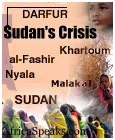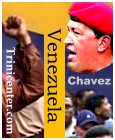 |






 AfricaSpeaks Weblog AfricaSpeaks Weblog
 Rootswomen Weblog Rootswomen Weblog
 Rootsie's Weblog Rootsie's Weblog
|
In Iraq, the word for US profits is caucuses
Posted: Thursday, January 29, 2004
By Stephen Gowans www3.sympatico.ca
Washington is balking at demands that direct elections be held to select a provisional government in Iraq, because it fears the "moderates" it backs won't win, imperilling its plans to make over the country as a Middle East model of free markets, free trade and free enterprise, thoroughly ensconced in the US economic orbit.
Officially, the US is reluctant to endorse elections because it says elections can't be organized by June 30th, the US-imposed deadline for the vote. But that's hokum, something even US officials obliquely concede, and UN officials quietly affirm.
"An electoral assessment team from the United Nations visited Iraq for two weeks over the summer and concluded that it was possible to set up mechanisms for direct elections within six months," reported the New York Times [1].
And according to Canada's The Globe and Mail, "UN officials say privately there are few practical obstacles to early elections," adding that "This is a country with decades of central controls which would make [creating an electoral roll] easier than it might appear'' [2].
What seems to concern Bremer and other US officials isn't whether an election can be organized in time, but who might win it.
"[D]irect, nation-wide elections," according to the Washington Post, is "a process that U.S. officials say would be... unpredictable in its outcome" [3].
And "what worries the UN," according to the Globe and Mail, "is that in the current environment, with virtually no party identification among the population, a rushed election could be hijacked" [4].
Hijacked by who?
By Iraqis themselves, voting for people they, rather than the US, want to lead their country.
As Bremer explained last summer, "In a postwar situation like this, if you start holding elections, the people who are rejectionists tend to win" [5].
That is, the people who reject the occupation, and reject US plans for the country, have the best chance of winning an election.
Who Iraqis elect should hardly be a concern to a country that professes to be a beacon of democracy, and justified its invasion of Iraq as being necessary to sweep away a dictator who was an obstacle to...elections.
Still, Brent Scowcroft, George H. W. Bush's national security adviser, shares Bremer's reluctance to turn the question of who should form a sovereign Iraqi government over to Iraqis themselves.
"What's going to happen the first time we hold an election in Iraq and it turns out the radicals win?" Scowcroft asked. "What do you do? We're surely not going to let them take over" [6].
Problem solved. Don't hold elections.
But that leaves another problem to deal with. Washington wants to get moving on its economic agenda for Iraq -- which includes a 15 percent flat tax, a phase out of subsidies on food, gasoline and other essentials, and the sell off of publicly owned companies. Problem is, they've run up against the Geneva Conventions.
It seems an occupation government isn't allowed to undertake the kind of wide-ranging economic reforms -- amounting to a capitalist dream, according to the Economist -- the US has envisioned. Only a sovereign government can do that.
Violating international law has never troubled Washington, but potential investors are spooked. They want to be sure their claims to Iraqi assets aren't going to be dragged through the courts.
Which means that turning Iraq into a capitalist dream is going to have to be left up to Iraqis themselves. Rejectionists -- that is, the people who might hijack an election by garnering more votes than the favored US candidates -- need not apply.
To freeze the rejectionists out, Washington plans to put Bremer at the head of a chain of appointments that would lead to a "sovereign" provisional government that can be counted upon to do Washington's bidding.
Here's how the convoluted, vaguely democratic sounding, caucus system would work: Bremer would appoint 18 regional organizing committees, which would then select delegates to 18 selection caucuses, which would then choose representatives to a national assembly, which would then appoint the new "sovereign" government of Iraq.
In other words, you could trace the make-up of the eventual government all the way back to Bremer himself, who, it's safe to say, won't be appointing rejectionists, who might in turn appoint other rejectionists, and so on.
And you could go back further than Bremer.
Considering that "Bremer was appointed to his post by President Bush and that Mr. Bush was appointed to his by the U.S. Supreme Court...you have," as Naomi Klein observes, "the glorious new democratic tradition of the appointocracy: rule by appointee's appointee's appointees' appointees' appointees' selectees" [7].
All the better to ensure Iraq is made over into an hospitable environment for US corporations.
Anyone who thinks this represents a new development in US foreign policy, ushered in by the neo-conservative fanatics of the Bush administration, might want to recall the words of Phil Ochs, which resonate as strongly today as they did some 40 years ago, when they were first written.
"The name for our our profits," said Ochs, "is democracy."
Only, these days, democracy -- and US profits -- go by the name "caucuses."
1. "Security Seen as Greatest Obstacle to Holding Direct Elections in Iraq by June 30," The New York Times, January 22, 2004.
2. "UN to mediate in Iraqi election impasse," The Globe and Mail, January 28, 2004.
3. "Shiites March for Elections in Iraq," The Washington Post, January 20, 2004.
4. UN to mediate in Iraqi election impasse...
5. "Occupation Forces Halt Elections Throughout Iraq," The Washington Post, June 28, 2003.
6. "Spoils of war," The New York Times, April 10, 2003.
7. "Bush's Iraq: An Appointocracy," The Globe and Mail, January 22, 2004.
 Printer friendly version Printer friendly version
 Send page by E-Mail Send page by E-Mail
|








